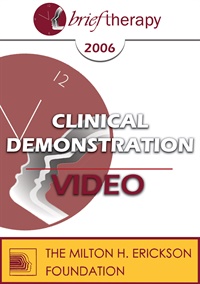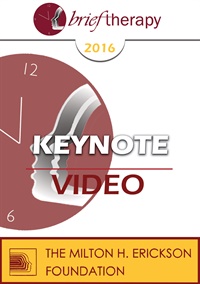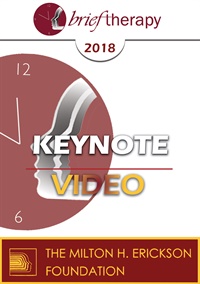- Average Rating:
- Not yet rated
- Topic Areas:
- Clinical Demonstrations | Multicultural | Supervision | Therapist Development
- Categories:
- Brief Therapy Conference | Brief Therapy Conference 2006
- Faculty:
- Kenneth Hardy, PhD
- Course Levels:
- Master Degree or Higher in Health-Related Field
- Duration:
- 56:00
- Format:
- Audio and Video
- Original Program Date:
- Dec 08, 2008
- Short Description:
- BT06 Clinical Demonstration 08 - Clinical Supervision & the Self of the Therapist: A Multicultural Perspective - Kenneth Hardy, PhD
- Price:
-
Sale is $29.00
price reduced from Base Price - $59.00
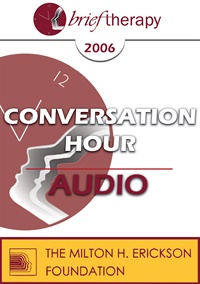
- Average Rating:
- Not yet rated
- Topic Areas:
- Conversation Hours | Brief Therapy | Boundaries | Multicultural
- Categories:
- Brief Therapy Conference | Brief Therapy Conference 2006
- Faculty:
- Steve Andreas, MA, NLP
- Duration:
- 58:28
- Format:
- Audio Only
- Original Program Date:
- Dec 08, 2006
- Short Description:
- This conversation hour explores personal boundaries as lived, physical experiences rather than abstract ideas. Through guided imagery, live demonstration, and audience participation, it shows how people sense distance, safety, and intrusion, and how flexible boundaries can be shaped to support connection, self-protection, and choice across different situations and cultures.
- Price:
- $15.00 - Base Price
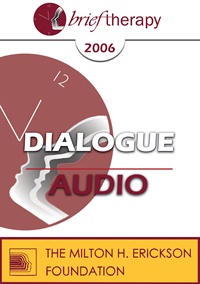
- Average Rating:
- Not yet rated
- Topic Areas:
- Dialogues | Multicultural | Brief Therapy
- Categories:
- Brief Therapy Conference | Brief Therapy Conference 2006
- Faculty:
- Kenneth Hardy, PhD | Monica McGoldrick, PhD
- Duration:
- 1:05:46
- Format:
- Audio Only
- Original Program Date:
- Dec 08, 2006
- Short Description:
- BT06 Dialogue 05 - Multicultural Therapy - Kenneth Hardy, PhD & Monica McGoldrick, M.A., LCSW
- Price:
- $15.00 - Base Price
Tags: Brief Therapy Multi-Cultural
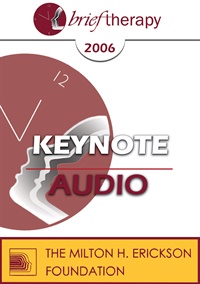
- Average Rating:
- Not yet rated
- Topic Areas:
- Keynotes | Multicultural | Brief Therapy | Professional Practice | Training
- Categories:
- Brief Therapy Conference | Brief Therapy Conference 2006
- Faculty:
- Patricia Arredondo, EdD
- Duration:
- 50:58
- Format:
- Audio Only
- Original Program Date:
- Dec 09, 2006
- Short Description:
- This keynote traces why multicultural counseling competencies are not optional add-ons, but central to ethical, effective psychotherapy. Grounded in history, lived experience, and clinical examples, it examines cultural encapsulation, power, identity, and the limits of Western models when culture is ignored. Therapists are invited to rethink how history, immigration, religion, gender, and economics shape the therapeutic encounter, and how cultural humility and self-reflection expand both clinical skill and relevance.
- Price:
- $15.00 - Base Price
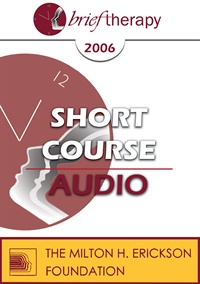
- Average Rating:
- Not yet rated
- Topic Areas:
- Short Courses | Brief Therapy | Meditation, Spirituality and Yoga | Multicultural | Psychotherapy
- Categories:
- Brief Therapy Conference | Brief Therapy Conference 2006
- Faculty:
- Lilian Borges, MA, LPC
- Duration:
- 1:18:38
- Format:
- Audio Only
- Original Program Date:
- Dec 07, 2006
- Short Description:
- In a world that is becoming more and more global and diverse, the need for a multicultural understanding of human experience is vital, especially for health care providers. Spirituality and religion are important elements of the culture. Spirituality and religion play a very important role in shaping how people are, the way they deal with birth and death, marriage and family, etc., and what is disease and how to cure it.
- Price:
- $15.00 - Base Price
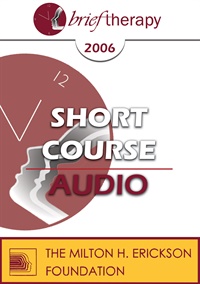
- Average Rating:
- Not yet rated
- Topic Areas:
- Short Courses | Multicultural | Brief Therapy | Family Therapy
- Categories:
- Brief Therapy Conference | Brief Therapy Conference 2006
- Faculty:
- Debra Ann Nixon, PhD
- Duration:
- 1:09:14
- Format:
- Audio Only
- Original Program Date:
- Dec 07, 2006
- Short Description:
- "Physician heal thyself" aptly describes this presentation for graduate supervisors/instructors who understand the need for increased diversity-mindedness amongst therapists. This presentation will focus on using proven pedagogical and therapeutic skills that will challenge graduate supervisors and instructors 1) to be self-relexive and diversity-minded and 2) to use themselves as the primary conduits of a new multicultural consciousness in teaching and supervision arenas.
- Price:
- $15.00 - Base Price
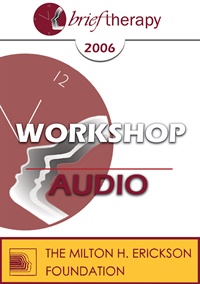
- Average Rating:
- Not yet rated
- Topic Areas:
- Workshops | Brief Therapy | Family Therapy | Multicultural | Cultural and Social Contexts
- Categories:
- Brief Therapy Conference | Brief Therapy Conference 2006
- Faculty:
- Patricia Arredondo, EdD
- Duration:
- 2:26:53
- Format:
- Audio Only
- Original Program Date:
- Dec 09, 2006
- Short Description:
- This session offers a grounded, experience-near look at working clinically with contemporary Latino families. Through cultural frameworks, lived examples, and extended case vignettes, participants explore values such as familismo, personalismo, respeto, machismo, and marianismo, alongside the real pressures of immigration, acculturation, gender roles, and shame. The work invites therapists to move beyond stereotypes, recognize strengths, and respond with cultural humility, practical strategies, and deeper attunement to family and generational dynamics in therapy.
- Price:
- $15.00 - Base Price
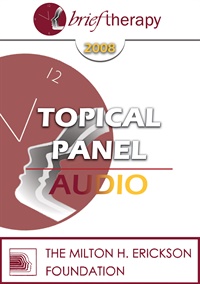
- Average Rating:
- Not yet rated
- Topic Areas:
- Topical Panels | Multicultural | Brief Therapy
- Categories:
- Brief Therapy Conference | Brief Therapy Conference 2008
- Faculty:
- Steven Hayes, PhD | Jeffrey Kottler, PhD | Mary Goulding, MSW | Claudio Naranjo, MD
- Duration:
- 59:40
- Format:
- Audio Only
- Original Program Date:
- Dec 13, 2008
- Short Description:
- BT08 Topical Panel 10 - Cross-Cultural Issues - Steven Hayes, PhD, Jeffrey Kottler, PhD, Mary Goulding, MSW, Claudio Naranjo, MD
- Price:
- $15.00 - Base Price
Tags: Brief Therapy Multi-Cultural
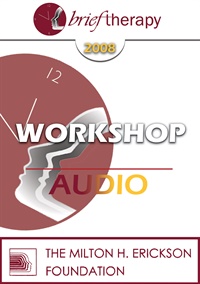
- Average Rating:
- Not yet rated
- Topic Areas:
- Workshops | Multicultural | Storytelling | Brief Therapy | Consciousness
- Categories:
- Brief Therapy Conference | Brief Therapy Conference 2008
- Faculty:
- Jean Houston, PhD
- Duration:
- 2:55:30
- Format:
- Audio Only
- Original Program Date:
- Dec 14, 2008
- Short Description:
- This workshop will explore archetypical and imaginal sources for Social Artistry, and address states of consciousness research as it applies to exploring the possible human and the possible society.
- Price:
- $15.00 - Base Price
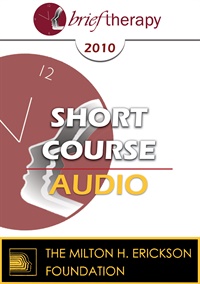
- Average Rating:
- Not yet rated
- Topic Areas:
- Short Courses | Brief Therapy | Multicultural | Social Issues
- Categories:
- Brief Therapy Conference | Brief Therapy Conference 2010
- Faculty:
- Naji Abi-Hashem, PhD
- Duration:
- 1:52:01
- Format:
- Audio Only
- Original Program Date:
- Dec 09, 2010
- Short Description:
- This wide ranging seminar looks at how globalization, secularism and rising fundamentalism shape the lives of clients and caregivers. The presenter explores identity, culture shock and the psychological fatigue created by rapid change, then offers ways to understand rigidity, polarization and radicalization without reducing them to pathology. Participants learn how to work more sensitively and flexibly across cultures, strengthen their own “cultural self” and support clients navigating loss, dislocation and shifting worldviews.
- Price:
- $15.00 - Base Price
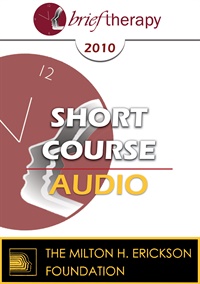
- Average Rating:
- Not yet rated
- Topic Areas:
- Short Courses | Meditation, Spirituality and Yoga | Mind-Body | Mindfulness | Multicultural | Belief Systems | Psychotherapy | Brief Therapy
- Categories:
- Brief Therapy Conference | Brief Therapy Conference 2010
- Faculty:
- Jeanne Hernandez
- Duration:
- 1:38:23
- Format:
- Audio Only
- Original Program Date:
- Dec 09, 2010
- Short Description:
- This workshop explores how the Indian belief system contains ingredients to keep the mind and body in harmony and promote wellbeing. We will explore adding into psychotherapy sessions totem strengths, shaman journeys, medicine wheels, time-frames, respect and gratitude; the circle of life, and symbols as reminders of the “right” path. With Jeanne Hernandez.
- Price:
- $15.00 - Base Price
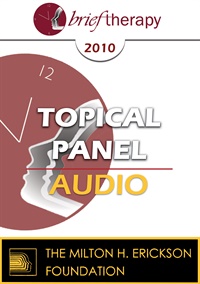
- Average Rating:
- Not yet rated
- Topic Areas:
- Topical Panels | Multicultural
- Categories:
- Brief Therapy Conference | Brief Therapy Conference 2010
- Faculty:
- Robert Dilts, BA | Kenneth Hardy, PhD | Jeffrey Kottler, PhD | Esther Perel, MA, LMFT
- Duration:
- 56:39
- Format:
- Audio Only
- Original Program Date:
- Dec 11, 2010
- Short Description:
- BT10 Topical Panel 01 - Cross-Cultural Issues - Robert Dilts, Kenneth Hardy, PhD, Jeffrey Kottler, PhD, Esther Perel, MA, LMFT
- Price:
- $15.00 - Base Price
Tags: Multi-Cultural
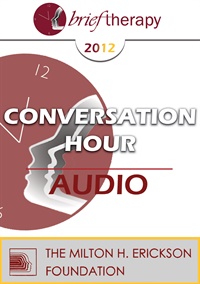
- Average Rating:
- Not yet rated
- Topic Areas:
- Conversation Hours | Multicultural
- Categories:
- Brief Therapy Conference | Brief Therapy Conference 2012
- Faculty:
- Kenneth Hardy, PhD
- Duration:
- 57:58
- Format:
- Audio Only
- Original Program Date:
- Dec 07, 2012
- Short Description:
- BT12 Conversation Hour 01 - Multicultural Issues - Kenneth Hardy, PhD Educational Objectives: Learn the philosophies of various practitioners and theorists.
- Price:
- $15.00 - Base Price
Tags: Multi-Cultural
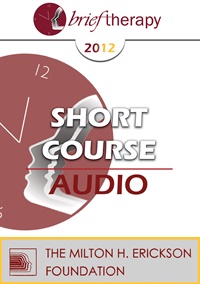
- Average Rating:
- Not yet rated
- Topic Areas:
- Psychotherapy | Meditation, Spirituality and Yoga | Short Courses | Multicultural
- Categories:
- Brief Therapy Conference | Brief Therapy Conference 2012
- Faculty:
- Assen Alladin, PhD
- Duration:
- 1:35:13
- Format:
- Audio Only
- Original Program Date:
- Dec 05, 2012
- Short Description:
- This short course shows how mindfulness can be woven into psychotherapy in practical, culturally responsive ways. Using case material, metaphor and a live hypnosis demonstration, the presenter illustrates how awareness, acceptance, gratitude and heart–mind integration help clients loosen rigid beliefs, reduce rumination and reengage with the present. Participants learn informal mindfulness strategies that complement CBT and hypnotherapy, offering clients experiential tools for emotional flexibility and renewed agency.
- Price:
- $15.00 - Base Price
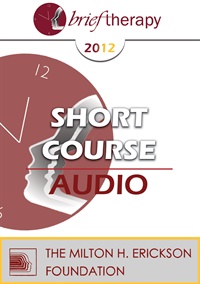
- Average Rating:
- Not yet rated
- Topic Areas:
- Short Courses | Multicultural | Therapist Development | Professional Practice
- Categories:
- Brief Therapy Conference | Brief Therapy Conference 2012
- Faculty:
- Bob Bertolino, PhD
- Duration:
- 1:26:07
- Format:
- Audio Only
- Original Program Date:
- Dec 09, 2012
- Short Description:
- Agencies face pressure to prove results while preserving creativity and clinical integrity. In this practical session, Bertolino outlines how to build a “culture of excellence” by grounding staff in a shared strength-based philosophy and tracking real-time client outcomes. He walks through dropout data, therapist effectiveness, feedback systems, and agency-wide implementation, offering a concrete roadmap for improving results without forcing allegiance to a single model.
- Price:
- $15.00 - Base Price
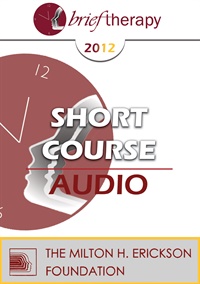
- Average Rating:
- Not yet rated
- Topic Areas:
- Short Courses | Communication | Multicultural
- Categories:
- Brief Therapy Conference | Brief Therapy Conference 2012
- Faculty:
- Sherri Reynolds
- Duration:
- 1:34:45
- Format:
- Audio Only
- Original Program Date:
- Dec 09, 2012
- Short Description:
- BT12 Short Course 41 – How Culture Impacts Communication – Sherri Reynolds, MA, MFT Participants will identify and analyze culture using 10 dimensions to break through communication barriers. Participants will learn to assess their own and their clients’ cultural styles of communication. Participants will also learn to apply specific techniques to facilitate more effective communication with clients, allowing them to establish lasting trust and develop a deeper relationship with clients from diverse cultures.
- Price:
- $15.00 - Base Price
Tags: Multi-Cultural
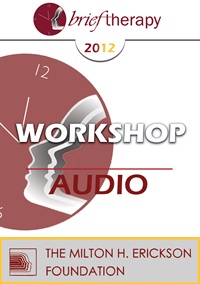
- Average Rating:
- Not yet rated
- Topic Areas:
- Trauma | Workshops | Multicultural
- Categories:
- Brief Therapy Conference | Brief Therapy Conference 2012
- Faculty:
- Kenneth Hardy, PhD
- Duration:
- 2:59:14
- Format:
- Audio Only
- Original Program Date:
- Dec 08, 2012
- Short Description:
- BT12 Workshop 23 – Understanding & Treating the Invisible Wounds of Socio-Cultural Trauma – Kenneth Hardy, PhD This workshop will provide a Socio-cultural view of trauma, highlighting the dynamics of the intersection of oppression and trauma. Strategies for effectively engaging and treating individuals and families with ‘oppression trauma’ will be discussed. Relevant Self of the Therapist issues will be explored.
- Price:
- $15.00 - Base Price
Tags: Multi-Cultural Trauma
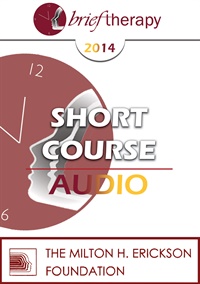
- Average Rating:
- Not yet rated
- Topic Areas:
- Short Courses | Multicultural | Existential Therapy | Brief Therapy | Meditation, Spirituality and Yoga
- Categories:
- Brief Therapy Conference | Brief Therapy Conference 2014
- Faculty:
- Naji Abi-Hashem, PhD
- Duration:
- 1:06:56
- Format:
- Audio Only
- Original Program Date:
- Dec 11, 2014
- Short Description:
- This short course reframes resilience as a cultural, communal and spiritual force rather than just an individual trait. Through stories, cross-cultural examples and practical questions, the presenter shows how people draw strength from heritage, community bonds, generational wisdom and meaningful relationships. Participants learn how to help clients reconnect with cultural identity, mobilize resources, and build resilience that supports adaptation, creativity and purpose in a rapidly changing world.
- Price:
- $15.00 - Base Price
- Average Rating:
- Not yet rated
- Topic Areas:
- Keynotes | Multicultural | Community
- Categories:
- Brief Therapy Conference | Brief Therapy Conference 2016
- Faculty:
- Erving Polster, PhD | Michael Yapko, PhD
- Course Levels:
- Master Degree or Higher in Health-Related Field
- Duration:
- 1:01:39
- Format:
- Audio and Video
- Original Program Date:
- Dec 09, 2016
- Short Description:
- Yapko and Polster examine the idea of “life focus” groups as a natural extension of psychotherapy, designed not for problem-solving but for cultivating reflection, belonging, and continuity in community. Highlighting themes like design, congregation, and continuity, the keynote draws parallels to religion, the arts, and large-scale social movements while imagining new, non-clinical spaces for shared growth. Participants gain a broader vision of how psychotherapy’s principles can inspire communal practices that enhance meaning and vitality in everyday life.
- Price:
-
Sale is $29.00
price reduced from Base Price - $59.00
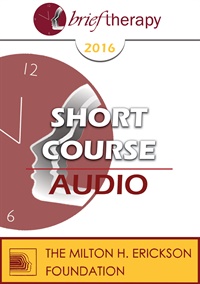
BT16 Short Course 32 - From East to West: Utilizing Consciousness and Strengths - John Lentz, D. MIN
- Average Rating:
- Not yet rated
- Topic Areas:
- Consciousness | Short Courses | Multicultural | Utilization
- Categories:
- Brief Therapy Conference | Brief Therapy Conference 2016
- Faculty:
- John Lentz, D. Min.
- Duration:
- 1:12:38
- Format:
- Audio Only
- Original Program Date:
- Dec 08, 2016
- Short Description:
- Working in collaboration with our clients to create solutions is one of the new directions that effectiveness based approaches advocate. The workshop leaders who live in Iran and United States respectively will be demonstrating these techniques. By utilizing culturally oriented assets, attendees will be offered a unique approach that can help empower people.
- Price:
- $15.00 - Base Price
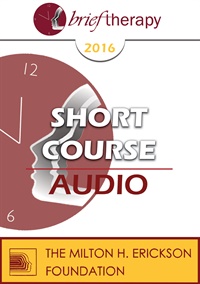
- Average Rating:
- Not yet rated
- Topic Areas:
- Short Courses | Brief Therapy | Community | Multicultural | Therapist Development
- Categories:
- Brief Therapy Conference | Brief Therapy Conference 2016
- Faculty:
- Karin Schlanger, MFT | Gloria Diaz Arnal, MFT Intern
- Duration:
- 1:11:09
- Format:
- Audio Only
- Original Program Date:
- Dec 08, 2016
- Short Description:
- Palo Alto Brief Therapy model applied in an educational context. Focus on advantages of using this approach when the context is a challenge in itself. The presenters – Ms. Schlanger is the heir to the MRI-Brief Therapy model, will bring examples illustrating a useful model when working with a diverse community.
- Price:
- $15.00 - Base Price
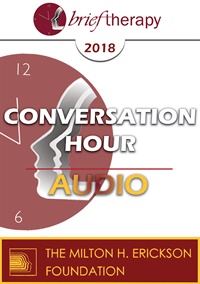
- Average Rating:
- Not yet rated
- Topic Areas:
- Great Conversations | Multicultural | Brief Therapy | Treatment Planning
- Categories:
- Brief Therapy Conference | Brief Therapy Conference 2018
- Faculty:
- Laura Brown, PhD | Elliott Connie, MA, LPC
- Duration:
- 1:05:53
- Format:
- Audio Only
- Original Program Date:
- Dec 08, 2018
- Short Description:
- Contemporary therapist need to understand culturally competent practice. Principles of assessment and treatment will be offered.
- Price:
- $15.00 - Base Price
Credit available - Click Here for more information
- Average Rating:
- Not yet rated
- Topic Areas:
- Keynotes | Multicultural | Psychotherapy | Brief Therapy | Training
- Categories:
- Brief Therapy Conference | Brief Therapy Conference 2018 | Online Continuing Education
- Faculty:
- Patricia Arredondo, EdD
- Course Levels:
- Master Degree or Higher in Health-Related Field
- Duration:
- 1:03:49
- Format:
- Audio and Video
- Original Program Date:
- Dec 05, 2018
- Short Description:
- This session looks closely at how Latinx immigrants and their families endure, adapt, and keep moving forward in the face of political pressure, cultural disruption, and uncertainty. Drawing on lived stories, social context, and clinical perspective, it explores acculturation stress, family dynamics, identity, and resilience anchored in values like family, faith, and pride. The talk offers therapists and students a grounded way to understand immigrant experience and bring greater sensitivity and perspective into their clinical work.
- Price:
-
Sale is $29.00
price reduced from Base Price - $59.00
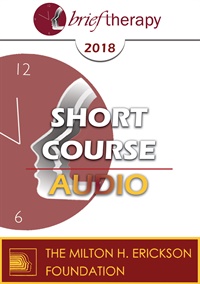
- Average Rating:
- Not yet rated
- Topic Areas:
- Short Courses | Communication | Multicultural | Sex and Sexuality | Brief Therapy
- Categories:
- Brief Therapy Conference | Brief Therapy Conference 2018
- Faculty:
- Mitra Rashidian, PhD
- Duration:
- 1:30:26
- Format:
- Audio Only
- Original Program Date:
- Dec 06, 2018
- Short Description:
- In this workshop, clinicians’ level of comfort, barriers, and attitudes when talking about sexuality will be highlighted, along with useful strategies to provide better engagement with their clients. Additional strategies used to build upon a person’s individual strengths to assist them in overcoming cultural and personal sexual imprints are offered.
- Price:
- $15.00 - Base Price
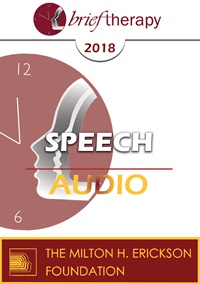
- Average Rating:
- Not yet rated
- Topic Areas:
- Speeches | Multicultural | Strategic Therapy | Brief Therapy | Strengths-Based
- Categories:
- Brief Therapy Conference | Brief Therapy Conference 2018
- Faculty:
- Terry Soo-Hoo, PhD
- Duration:
- 1:42:11
- Format:
- Audio Only
- Original Program Date:
- Dec 09, 2018
- Short Description:
- The Culturally Sensitive Strength-Based Strategic Therapy method was developed to integrate various principles founded by the Mental Research Institute (MRI) and Jay Haley’s Strategic Therapy approach as well as other methods to address these issues. In this workshop, guidelines will be presented for learning the principles of Culturally Sensitive Strength-Based Strategic Therapy. There will be an emphasis on effective strategies in working within the cultural context of the client and how this is critical to successful therapy. A structure will be presented for organizing the specific tasks and skills involved in different aspects of the method including activating the client’s strengths. Case examples, some on video recordings, will illustrate many innovative brief therapy techniques.
- Price:
- $15.00 - Base Price


